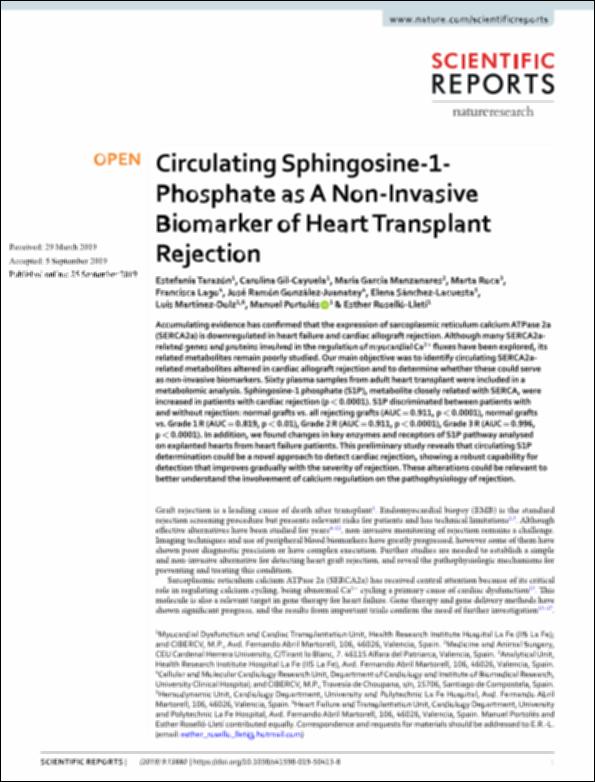Please use this identifier to cite or link to this item:
http://hdl.handle.net/10637/10899Circulating sphingosine-1-phosphate as a non-invasive biomarker of heart transplant rejection.
| Title: | Circulating sphingosine-1-phosphate as a non-invasive biomarker of heart transplant rejection. |
| Authors : | Tarazón Melguizo, Estefanía Gil Cayuela, Carolina García Manzanares, María Dolores Roca Marugán, Marta Lago Paz, Francisca González Juanatey, José Ramón Roselló Lletí, Esther |
| Keywords: | Trasplantes (Medicina) - Complicaciones y secuelas.; Corazón - Trasplante - Complicaciones y secuelas.; Biochemical markers.; Transplantation of organs, tissues, etc. - Complications.; Heart - Transplantation - Complications.; Marcadores bioquímicos. |
| Publisher: | Springer Nature. |
| Citation: | Tarazón, E., Gil-Cayuela, C., García Manzanares, M., Roca, M., Lago, F., González-Juanatey, JR. et al. (2019). Circulating sphingosine-1-phosphate as a non-invasive biomarker of heart transplant rejection. Scientific Reports, vol. 9, art. 13880 (25 sep.). DOI: https://doi.org/10.1038/s41598-019-50413-8 |
| Abstract: | Accumulating evidence has confrmed that the expression of sarcoplasmic reticulum calcium ATPase 2a (SERCA2a) is downregulated in heart failure and cardiac allograft rejection. Although many SERCA2arelated genes and proteins involved in the regulation of myocardial Ca2+ fuxes have been explored, its related metabolites remain poorly studied. Our main objective was to identify circulating SERCA2arelated metabolites altered in cardiac allograft rejection and to determine whether these could serve as non-invasive biomarkers. Sixty plasma samples from adult heart transplant were included in a metabolomic analysis. Sphingosine-1 phosphate (S1P), metabolite closely related with SERCA, were increased in patients with cardiac rejection (p<0.0001). S1P discriminated between patients with and without rejection: normal grafts vs. all rejecting grafts (AUC=0.911, p<0.0001), normal grafts vs. Grade 1R (AUC=0.819, p<0.01), Grade 2R (AUC=0.911, p<0.0001), Grade 3R (AUC=0.996, p<0.0001). In addition, we found changes in key enzymes and receptors of S1P pathway analysed on explanted hearts from heart failure patients. This preliminary study reveals that circulating S1P determination could be a novel approach to detect cardiac rejection, showing a robust capability for detection that improves gradually with the severity of rejection. These alterations could be relevant to better understand the involvement of calcium regulation on the pathophysiology of rejection. |
| Description: | Este es el artículo que se ha publicado de forma definitiva en: https://www.nature.com/articles/s41598-019-50413-8 En este artículo también participan Elena Sánchez-Lacuesta, Luis Martínez-Dolz, Manuel Portolés y Esther Roselló-Lletí. |
| URI: | http://hdl.handle.net/10637/10899 |
| Rights : | http://creativecommons.org/licenses/by/4.0/deed.es |
| ISSN: | 2045-2322 (Electrónico). |
| Issue Date: | 25-Sep-2019 |
| Center : | Universidad Cardenal Herrera-CEU |
| Appears in Collections: | Dpto. Medicina y Cirugía Animal |
Items in DSpace are protected by copyright, with all rights reserved, unless otherwise indicated.


